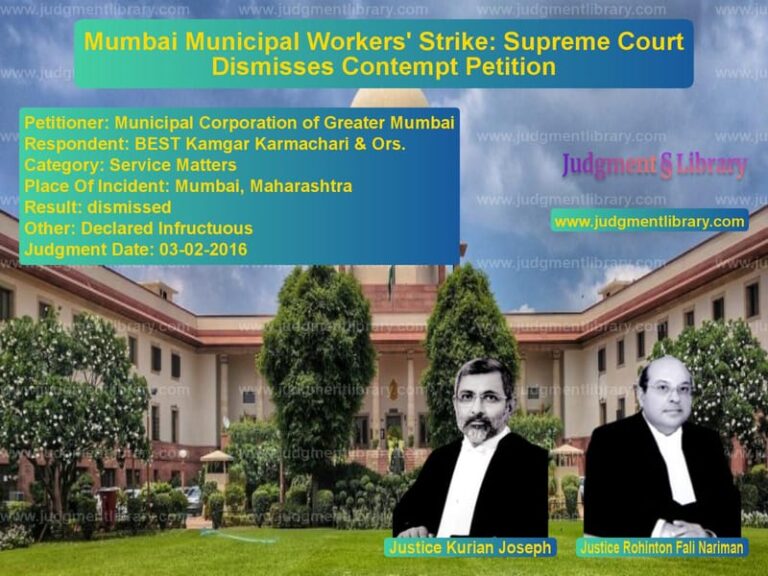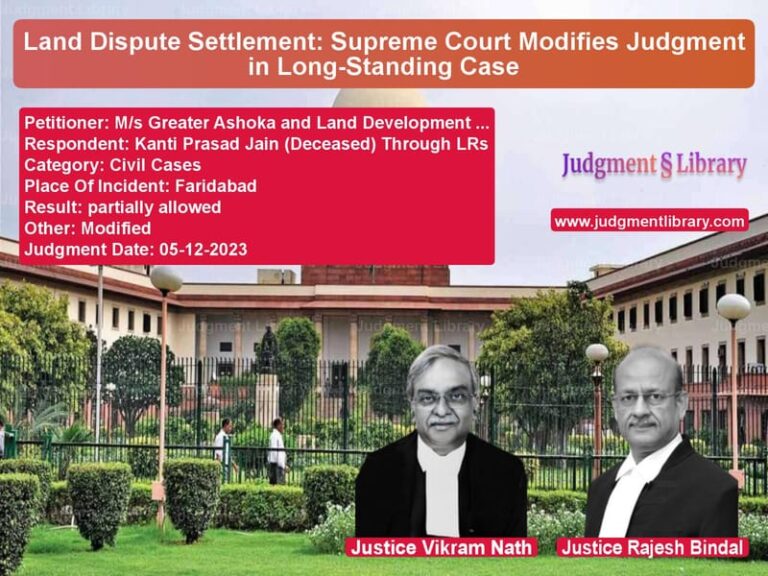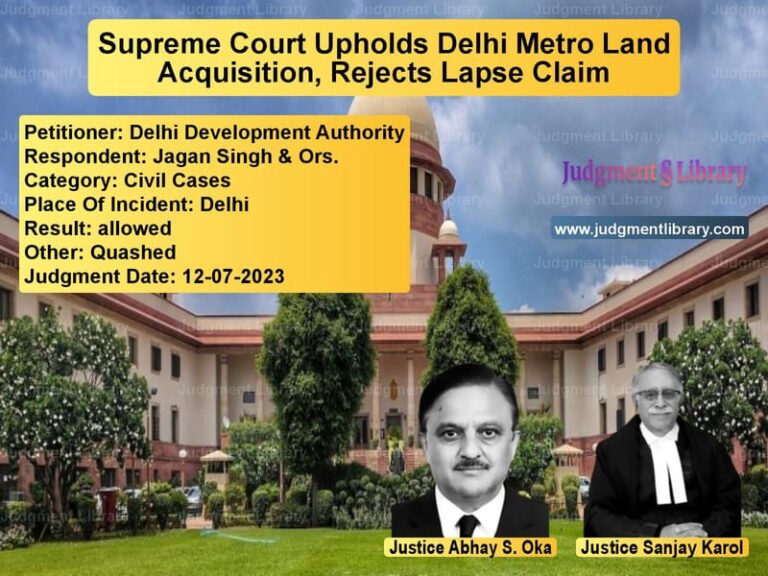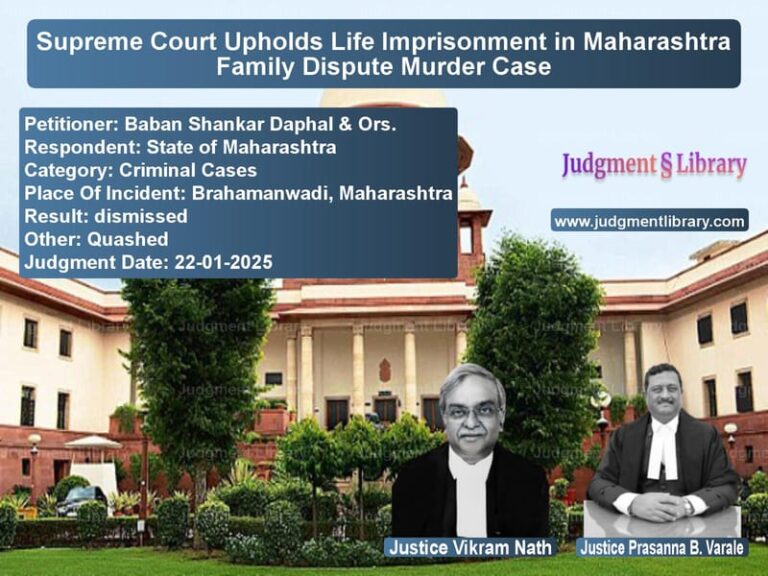Supreme Court Rules on Jurisdiction of Special Judge in NRHM Scam Case
The case of M/s. HCL Infosystem Ltd. & Dr. Vijai Tripathi v. Central Bureau of Investigation revolved around the jurisdiction of the Special Judge appointed under the Prevention of Corruption Act, 1988 (PC Act) to try a person other than a public servant when the public servant had died before the commencement of trial. The Supreme Court, in its judgment dated August 9, 2016, upheld the jurisdiction of the Special Judge, affirming that cases related to the NRHM Scam could be tried together under a designated court.
Background of the Case
The matter arose from the National Rural Health Mission (NRHM) Scam, which involved alleged misappropriation of government funds to the tune of Rs. 9,000 crores allocated to Uttar Pradesh between 2005-2006. The Central Bureau of Investigation (CBI) was directed by the Lucknow Bench of the High Court to investigate the scam, which uncovered a series of murders linked to the case, including two Chief Medical Officers and other government officials.
As part of the investigation, multiple charge sheets were filed, including charges against M/s. HCL Infosystem Ltd. and Dr. Vijai Tripathi, among others. While some of the accused were public servants, others were private individuals or companies alleged to have conspired with them.
The key legal question was whether, after the death of the public servant, the Special Judge appointed under the PC Act retained jurisdiction over the remaining accused individuals who were not government employees.
Legal Issues
- Whether the Special Judge under the PC Act had jurisdiction to try non-public servants if the primary accused public servant had died before the trial commenced.
- Whether the High Court correctly interpreted the law by designating a single Special Judge to handle all NRHM Scam cases.
- Whether cases involving the Prevention of Corruption Act and those without PC Act charges could be tried together in the same court.
Petitioner’s Arguments (M/s. HCL Infosystem Ltd. & Dr. Vijai Tripathi)
The petitioners argued:
- The Special Judge lacked jurisdiction to continue the trial against them after the death of the public servant.
- The charges against them were primarily under Section 120B (criminal conspiracy) and Sections 409 and 420 (criminal breach of trust and cheating) of the Indian Penal Code (IPC), with no independent charge under the PC Act.
- Since the case was now purely under IPC, it should be transferred to a regular criminal court.
- The trial before a Special Judge caused undue prejudice and affected their legal rights.
Respondent’s Arguments (Central Bureau of Investigation)
The CBI countered with the following points:
- The NRHM Scam was a large-scale financial crime involving both public servants and private individuals.
- The Special Judge was designated to handle all NRHM-related cases to ensure consistency and prevent contradictory rulings.
- There was sufficient evidence linking the petitioners to the conspiracy under the PC Act, even though they were not public servants.
- The precedent set in Essar Teleholdings Ltd. v. Registrar General, Delhi High Court supported the decision to try all connected cases in one special court.
Supreme Court’s Observations and Ruling
1. Special Judge Retains Jurisdiction Over NRHM Scam Cases
The Court noted that the Special Judge was appointed to handle all cases related to the NRHM Scam:
“The Special Judge was designated to deal with all NRHM scam matters across Uttar Pradesh. His jurisdiction was not limited to cases strictly under the PC Act but extended to all related offenses.”
The Court emphasized that consolidating all cases before a single judge was an effective legal measure to prevent conflicting rulings.
2. The Death of the Public Servant Does Not Affect Jurisdiction
The Court ruled that the death of the public servant did not automatically strip the Special Judge of jurisdiction:
“The charge of conspiracy under IPC can continue against co-accused individuals even if the principal accused public servant is no longer alive.”
The Court distinguished this case from State v. Jitender Kumar Singh, where the public servant’s death before framing of charges led to the case being transferred to a magistrate. In contrast, the NRHM Scam cases were all assigned to a Special Judge, who was authorized to handle both PC Act and non-PC Act cases.
3. Consistency in Trial and Avoidance of Legal Fragmentation
The Supreme Court highlighted the importance of judicial consistency:
“The trial of all related cases by a single court ensures uniformity in the appreciation of evidence and prevents the possibility of conflicting findings.”
The Court emphasized that splitting cases among different courts could result in a fragmented trial process and potentially contradictory verdicts.
4. No Prejudice Caused to the Accused
The Court rejected the petitioners’ argument that their trial before a Special Judge caused prejudice:
“The trial process remains governed by the Code of Criminal Procedure, ensuring fair proceedings irrespective of the forum.”
The Court found no procedural or substantive disadvantage in continuing the trial before the Special Judge.
Final Verdict
The Supreme Court dismissed the appeals and ruled:
- The Special Judge retained jurisdiction to try all NRHM-related cases, including those involving non-public servants.
- The death of the public servant did not affect the continuation of proceedings against the remaining accused.
- The High Court’s designation of a single Special Judge for all NRHM Scam cases was legally valid.
- The trial of the accused petitioners would proceed in the Special Court as per the previous order.
Key Takeaways
- The Special Judge appointed under the PC Act can try cases involving non-public servants if they are part of a conspiracy with a public servant.
- The death of a public servant before trial does not necessarily strip a Special Judge of jurisdiction.
- Judicial consistency is crucial in large-scale financial crimes to ensure uniform legal interpretation.
- Consolidation of related cases under one judge prevents conflicting verdicts.
- Accused individuals do not suffer prejudice merely because their trial is conducted in a Special Court.
Impact of the Judgment
The ruling has significant implications for the prosecution of financial crimes:
- It clarifies the jurisdiction of Special Judges in corruption-related cases.
- It reinforces the importance of judicial consistency in complex fraud and conspiracy cases.
- It ensures that non-public servants involved in conspiracies with government officials can still be prosecuted effectively.
- It sets a precedent for handling large-scale corruption cases under unified judicial forums.
In conclusion, the Supreme Court’s decision in M/s. HCL Infosystem Ltd. & Dr. Vijai Tripathi v. CBI affirms that Special Judges can oversee cases beyond the PC Act if they relate to a larger financial crime scheme. The ruling ensures the effective prosecution of corruption and fraud cases linked to government schemes.
Don’t miss out on the full details! Download the complete judgment in PDF format below and gain valuable insights instantly!
Download Judgment: Ms. HCL Infosystem vs Central Bureau of In Supreme Court of India Judgment Dated 09-08-2016-1741878476183.pdf
Direct Downlaod Judgment: Direct downlaod this Judgment
See all petitions in Money Laundering Cases
See all petitions in Fraud and Forgery
See all petitions in Judgment by V. Gopala Gowda
See all petitions in Judgment by Adarsh Kumar Goel
See all petitions in dismissed
See all petitions in supreme court of India judgments August 2016
See all petitions in 2016 judgments
See all posts in Criminal Cases Category
See all allowed petitions in Criminal Cases Category
See all Dismissed petitions in Criminal Cases Category
See all partially allowed petitions in Criminal Cases Category







